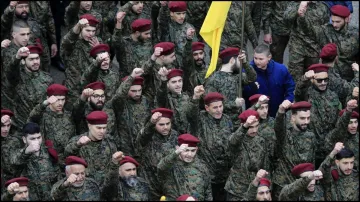Thousands of Iran-backed fighters offer to join Hezbollah against Israel as another regional conflict looms
Prospects of another simmering regional conflict grew as Hezbollah fired hundreds of rockets toward Israel in retaliation for the death of a senior commander killed in an Israeli airstrike. Hezbollah leader Hassan Nasrallah said the group already has 100,000 fighters to fight a war.

Beirut: Thousands of fighters from Iran-backed groups in the Middle East have offered to come to Lebanon to join the militant group Hezbollah in its battle against Israel if the simmering conflict escalates into a full-blown war, raising fears of another regional conflict alongside the ongoing war in Gaza, after the showdown with Iran in April.
There has been almost daily exchanges of fire along Lebanon's frontier with northern Israel since fighters from the Hamas-controlled Gaza Strip staged an unprecedented attack on southern Israel on October 7 that set off a war in Gaza. The situation to the north worsened this month after an Israeli airstrike killed a senior Hezbollah military commander in southern Lebanon.
Hezbollah retaliated by firing hundreds of rockets and explosive drones into northern Israel after Eid. As the cross-border firing continued, Israel threatened a military offensive in Lebanon if there was no negotiated end to push Hezbollah away from the border. Hezbollah leader Hassan Nasrallah on Wednesday said militant leaders from countries in the Middle East have offered to send thousands of Iran-backed forces to help Hezbollah.
Israeli Prime Minister Benjamin Netanyahu has warned Israel would "turn Beirut into Gaza" in the event of a war. However, a wider escalation could also overwhelm Israel's famed Iron Dome missile defence system that has so far intercepted most of the hundreds of missiles fired by Hezbollah.
Iran-backed forces in Middle East
Nasrallah claimed that Hezbollah already has more than 100,000 fighters. “We told them, thank you, but we are overwhelmed by the numbers we have,” he said, adding that the battle in its current form is using only a portion of Hezbollah's manpower, an apparent reference to the specialised fighters who fire missiles and drones.
However, Nasrallah had previously hinted at the possibility of an all-out war with Israel in 2017 in which he said fighters from several countries "will be partners". Over the past decade, Iran-backed fighters from Lebanon, Iraq, Afghanistan and Pakistan fought together in Syria's 13-year conflict, helping tip the balance in favour of Syrian President Bashar Al-Assad.
Officials from Lebanese and Iraqi groups backed by Iran say Iran-backed fighters from around the region will join in if war erupts on the Lebanon-Israel border. Thousands of such fighters are already deployed in Syria and could easily slip through the porous and unmarked border. Some of the groups have already staged attacks on Israel and its allies since the Israel-Hamas war started on October 7.
Iran's Axis of Resistance
Nasrallah became the leader of Hezbollah in 1992 after his predecessor was killed in an Israeli attack and has now become one of the most influential political figures in the country. He is widely popular among the Lebanese for presiding over Israel's withdrawal from the southern region of the country.
Iran's 'Axis of Resistance' comprises of several groups such as Hezbollah, Hamas and the Houthis in Yemen that are believed to be financed by Tehran. Hezbollah has deep ties with Hamas, as the latter also has a presence in Lebanon. Both groups are allies and are designated as terrorist organisations.
The groups from the so-called “axis of resistance” say they are using a “unity of arenas strategy” and they will only stop fighting when Israel ends its offensive in Gaza against their ally, Hamas. “We will be (fighting) shoulder to shoulder with Hezbollah” if an all-out war breaks out, one official with an Iran-backed group in Iraq told The Associated Press in Baghdad.
Fighters from Iraq's Popular Mobilization Forces, Afghanistan's Fatimiyoun, Pakistan's Zeinabiyoun and the Iran-backed rebel group in Yemen known as Houthis could come to Lebanon to take part in a war. The Houthis are already involved in the Israel-Hamas conflict, staging attacks on ships in the Gulf of Aden and the Red Sea linked with Israel.
Can Hezbollah fight Israel?
Hezbollah has been firing rockets at Israel in solidarity with its Palestinian ally Hamas since the Gaza war erupted in October, forcing tens of thousands to flee homes in Israel, where political pressure is building for tougher action. Tens of thousands of Lebanese have also fled their homes following Israeli strikes in south Lebanon.
Concerned at the risk of a slide into a war that could spread across the region, just like the same feared with Iran, US President Joe Biden sent his special envoy Amos Hochstein to embark on a new round of diplomacy this week and Secretary of State Antony Blinken told Israeli officials to avoid further escalation.
While Israel has the most powerful army in the Middle East, Hezbollah has thousands of fighters, many with experience in the Syrian civil war, and an arsenal of tens of thousands of missiles capable of hitting cities all over Israel. It also has a large fleet of drones, one of which appears to have carried out an extended flight over the port city of Haifa this week, underlining the potential threat to key economic infrastructure including power systems.
(with inputs from agencies)
ALSO READ | Hezbollah to halt attacks on Israel if Hamas agrees to ceasefire in Gaza: Sources